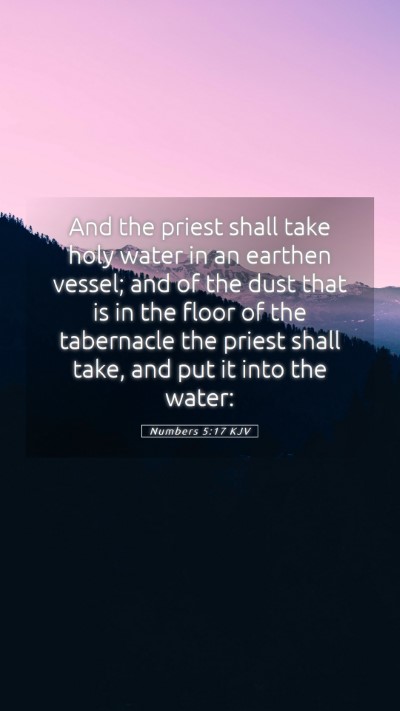Understanding Numbers 5:17: A Comprehensive Bible Verse Explanation
Bible Verse: Numbers 5:17
The verse reads as follows: "And the priest shall take holy water in an earthen vessel; and of the dust that is in the floor of the tabernacle the priest shall take, and put it into the water."
Meaning of Numbers 5:17
Numbers 5:17 is part of a larger context where the Israelite community was given laws concerning marital fidelity and the procedures for dealing with suspected infidelity. The meaning of this verse can be understood through various angles, as highlighted by recognized commentaries.
Bible Verse Meanings and Interpretations
In this verse, we see how the priest plays a crucial role in the ritual concerning a woman suspected of unfaithfulness. The priest initiates a significant process meant to ascertain the truth of the situation.
- Action of the Priest: The priest's actions represent the mediation between humanity and God. This reflects the importance of spiritual authority in establishing justice and truth within the community.
- Holy Water Significance: The use of holy water symbolizes purification and judgment. Water often represents life and cleansing throughout Scripture.
- Dust of the Tabernacle: The dust signifies that the procedure is conducted in a holy space, emphasizing the seriousness of the matter at hand. It also suggests a connection to humanity’s earthly nature.
Historical Context of the Passage
This passage must be understood in the ancient Israelite context, where community purity was vital. The Israelites were under the Mosaic Law, which governed various aspects of life, including moral behavior and community standards.
Application of Numbers 5:17 in Daily Life
Though this specific ritual is not practiced today, the underlying principles of seeking truth, maintaining community integrity, and the importance of mediation can still apply to modern believers. It urges one to reflect on personal relationships and spiritual fidelity.
Biblical Exegesis and Commentary Insights
Matthew Henry's Commentary
Matthew Henry emphasizes that this ritual illustrates God’s concern for purity among His people. He notes the importance of the priest’s role in distinguishing between truth and falsehood, crucial for maintaining justice in the community.
Albert Barnes' Notes
Albert Barnes elaborates that the ritual serves as a divine method for revealing the truth in cases of suspected infidelity. He highlights its function not just as a legal procedure but as a demonstration of God’s ability to judge the heart and motives.
Adam Clarke's Commentary
Adam Clarke points out the symbolic nature of the ingredients used in this ceremonial law. The earthiness of the dust and the purity of the holy water serve to reflect the dual nature of human existence—both earthly and spiritual.
Understanding Scripture through Cross References
- Deuteronomy 22:22-27: The law regarding adultery and its consequences.
- Proverbs 5:15-20: Wisdom literature addressing fidelity and marital commitment.
- James 1:14-15: Insights into temptation and sin, emphasizing the need for vigilance in relationships.
Conclusion: In-Depth Bible Study Insights
Through the lens of Numbers 5:17, we glean significant insights into the importance of maintaining spiritual integrity and the role of community in upholding moral standards. This passage encourages reflection on how ancient practices can speak to modern ethical dilemmas and relational fidelity.
Keywords: Bible verse meanings, Bible verse interpretations, Bible study insights, understanding Scripture, applying Bible verses to daily life.


